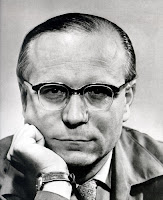Review
When reading the book's
introduction, I fell in love with this writer before even starting a
word of the story to follow. It was his responses to several
interview questions that had me. When asked what the crucial event
of his life was, his reply was “learning to read.” Another time
he was asked how he'd like to die ... a morbid question I thought.
Yet when reading his answer was “in bed with a book,” I thought
exactly! Koeppen also was
noted as saying “It is perhaps my only boast, not to have served in
Hitler's armies for a single hour.”
The Hothouse is set
in the capital of postwar Germany, the city of Bonn and takes place
over a period of two days. Readers will follow thoughts and actions
of Keentenheuve, a member of parliament. He has recently returned to
his homeland, having been away in England for several years to avoid
Nazism. Keentenheuve is a brooding character and wants to work at
restoring his beloved county, but isn't sure he can trust his
colleagues who each represent different factions. Haunted by their
country's involvement in WWII, and the atrocities served by German
government, everyone seems to have mistrust, guilt, and a jaded sense
of reality.
In the book’s opening
chapter Keentenheuve is introduced as a grieving widower. His much
younger wife, Elke, has tragically succumbed to an alcohol / drug
overdose. This sets a sad tone that stays with the story, as
emotions can't improve greatly in just two days. Keentenheuve feels
responsible; for neglecting his wife. He has spent too many nights
at his government apartment, leaving Elke alone to find company with
the wrong crowd.
The writing style of
Koeppen is very descriptive, lyrical, and somewhat complex, with
sometimes paragraph-long sentences. I also discovered new (sometimes
forgotten) words that increased my range of vocabulary. For
instance, another way of saying something is odd … can be referred
to as something “droll.” Lexicons would love this book, and
because of its poetic style, it is very beautiful when read aloud.
Here’s an example of
Koeppen’s style and also marks his character's feeling of despair
quite well … “He had attended committee meetings, he had spoken
in parliament, he had revised legislation, he didn’t understand it,
he could have stayed at Elke’s side, stayed on the side of youth,
and perhaps, if he hadn’t done everything wrong, it might have been
on the side of life as well. One human being was enough to give
meaning to life. Work wasn’t enough. Politics weren’t enough.
Those things didn’t protect him from the colossal futility of
existence. It was a mild futility. It didn’t hurt. It didn’t
stretch out long ghost arms to catch at the MP. It didn’t throttle
him. It was just there. And it remained. Futility had shown itself
to him, it had introduced itself to him, and now his eyes were open,
now he could see it everywhere, and it would never disappear, it
would never become invisible to him.”
I shared this book with
Gerhardt and Johanna from Ashe County’s German Club to get their
take on the story. They both agreed that the rambling, and yes
sometimes repetetive wording, can be a bit much at times. Maybe
something was lost in translation and reading it in its original
language would have been more enjoyable for them. Although, others
in our book group savored the lyrical phrasing, which often took on
stream of consciousness, roll-and-flow-like thoughts. Koeppen lets
readers ‘become’ his character with this technique. As always
book club fare highlights food mentioned in the story. With this book
there were sugared almonds, potato cakes, fizzy lemonade, and
Cheryl's delicious version of Beef Steak Esterhazy. I discovered
when researching the name Esterhazy, (belonging to a German political
family), that it is often descriptive of foods including scorched
onions. Karin, another member of the German club, introduced us to
stollen, a German fruit bread often served at Christmas … perfect
since this story takes place during the holiday season! Reading this
book was a cultural experience for me that increased my knowledge in
so many areas. If you decide to read this book I recommend
digesting it slowly so as not to “choke” on unfamiliar words or
miss out on Koeppen's descriptive detail.

Comments
Post a Comment